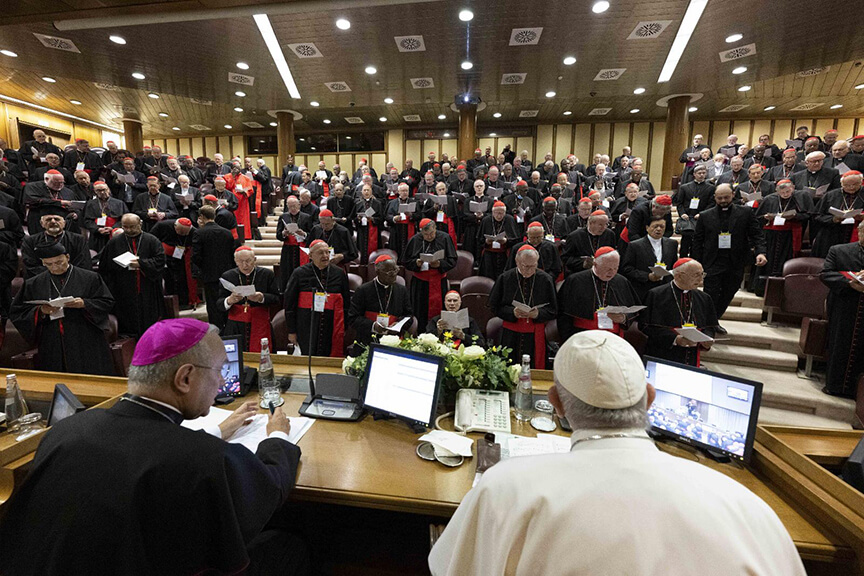
VATICAN CITY. From the beginning of his pontificate 10 years ago, Pope Francis set out to reform the structure and attitudes of the Roman Curia and knew he also had to reform the Vatican’s financial system and stewardship of resources.
One month after his election, he announced he was forming an international Council of Cardinals to advise him on governance and, in September 2013, the council began studying ways to reorganize the Curia.
Nine years passed before Pope Francis promulgated “Praedicate Evangelium” (“Preach the Gospel”), his apostolic constitution finalizing the Curia reorganization and highlighting its role as a body existing to help the pope and local bishops share the Gospel and care for the poor.
The emphasis on service and evangelization was a point Pope Francis made repeatedly to Curia officials, most notably in his annual Christmas greetings, which often were seen as more chastising than cheery.
The most famous of those speeches came in 2014 when he listed the “diseases” to which Curia officials are susceptible, including: thinking they are “downright indispensable”; “the ‘Martha complex’ of excessive busy-ness”; “mental and spiritual ‘petrification’” or having “a heart of stone”; “spiritual Alzheimer’s disease,” which involves forgetting one’s own salvation and vocational call; gossiping; and idolizing or courting superiors in the hope of promotion.
But nine years is a long time to accomplish what was supposed to be a priority.
Canadian Cardinal Michael Czerny said that says something about the pope, which is “that before he has, let’s say, a managerial style or business administration model, he’s a man of faith and hope and, indeed, of charity.”
“In other words, to have the faith to spend nine years to work out a reform before springing it on everyone, I think is magnificent,” he said. “It’s absolutely mind blowing to have that kind of faith, not to be anxious and rush and push and cajole, and all sorts of other things that many of us are very tempted to do and, in fact, do do” only to find out that no one was onboard.
The economic and financial reforms are going even more slowly, and their urgency is seen in the Vatican’s mega-trial of 10 people, including Cardinal Angelo Becciu, on charges of financial malfeasance related to a property deal in which the Vatican lost some $200 million.
Pope Francis has expanded the efforts begun by Pope Benedict XVI to monitor transactions, standardize budgeting procedures, and ensure the Vatican bank and other financial offices are not being used for illegal activity.
In 2014 the pope established the Council for the Economy, a body of eight cardinals and bishops and seven lay experts “to consider policies and practices and to prepare and analyze reports on the economic-administrative activities of the Holy See.”
He also set up the Secretariat for the Economy, which reports to the council, and was to have “authority over all the economic and administrative activities within the Holy See and the Vatican City State,” including budget making, financial planning, hiring, procurement, and the preparation of detailed financial statements.
The first head of the secretariat was Cardinal George Pell, who set out to consolidate the use of modern budgeting practices, beginning with giving the pope an accurate picture of the assets and expenditures of all Vatican offices, including the Secretariat of State.
But that led to some tensions with offices that were used to keeping their own accounts. In December 2014, Cardinal Pell said in an interview that the new budgeting and reporting procedures had meant his office discovered “some hundreds of millions of euros were tucked away in particular sectional accounts and did not appear on the balance sheet.”
The Vatican press office jumped in a day later to clarify that the money did not represent “illegal, illicit, or badly managed funds,” just assets being held in numerous administrative offices that were not considered part of the main institutions of the Roman Curia.
In 2020 Pope Francis named Jesuit Father Juan Antonio Guerrero Alves to lead the secretariat; when he stepped down in November after almost three years in the job, he said progress had been made in improving the transparency and credibility of Vatican financial activities and accounting.
However, he said, the goal of reform continues, particularly in centralizing investments rather than having multiple offices handling their own; clarifying and simplifying the rules for purchases and awarding contracts; and completing the setup of the new Directorate for Human Resources.









